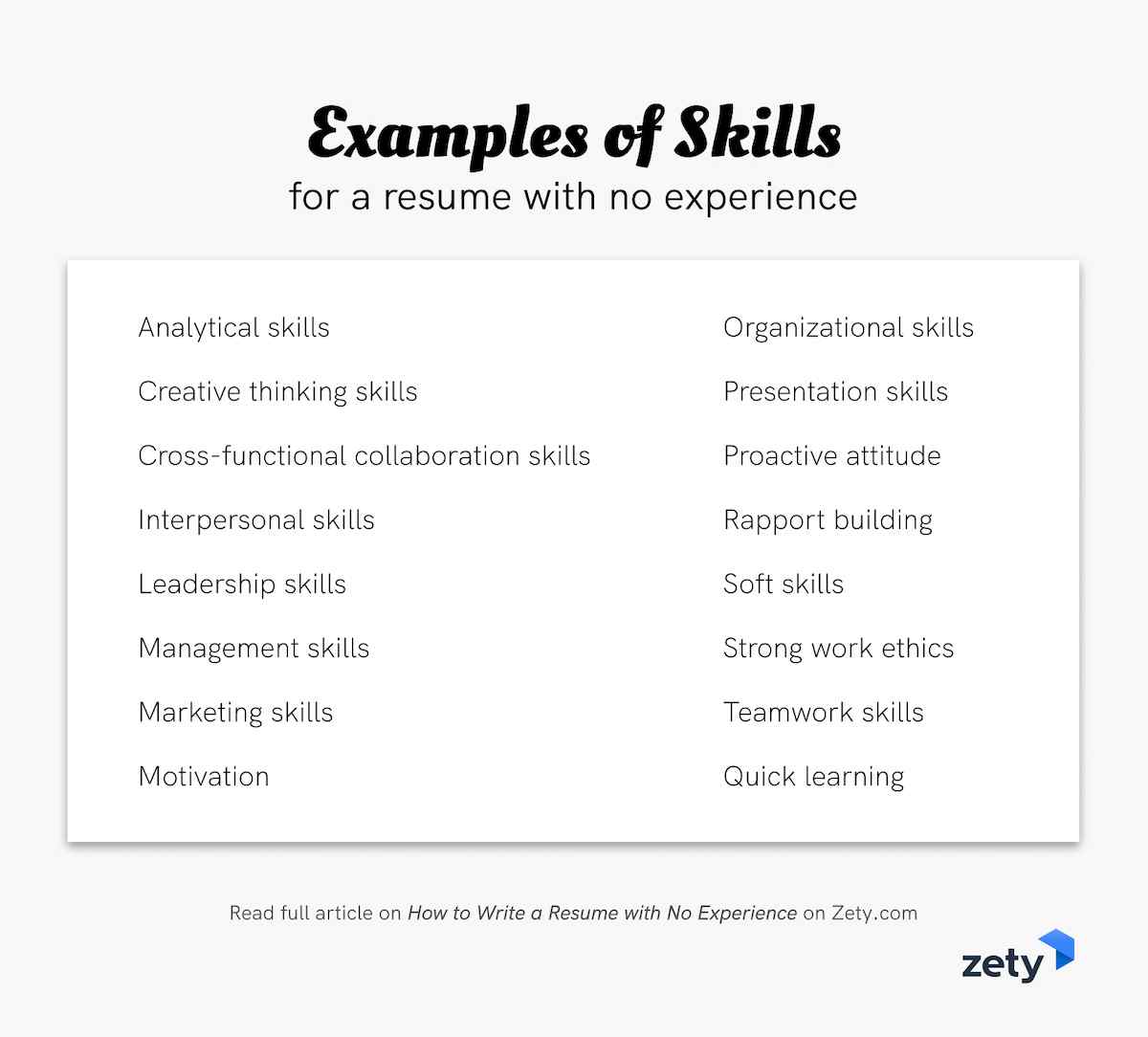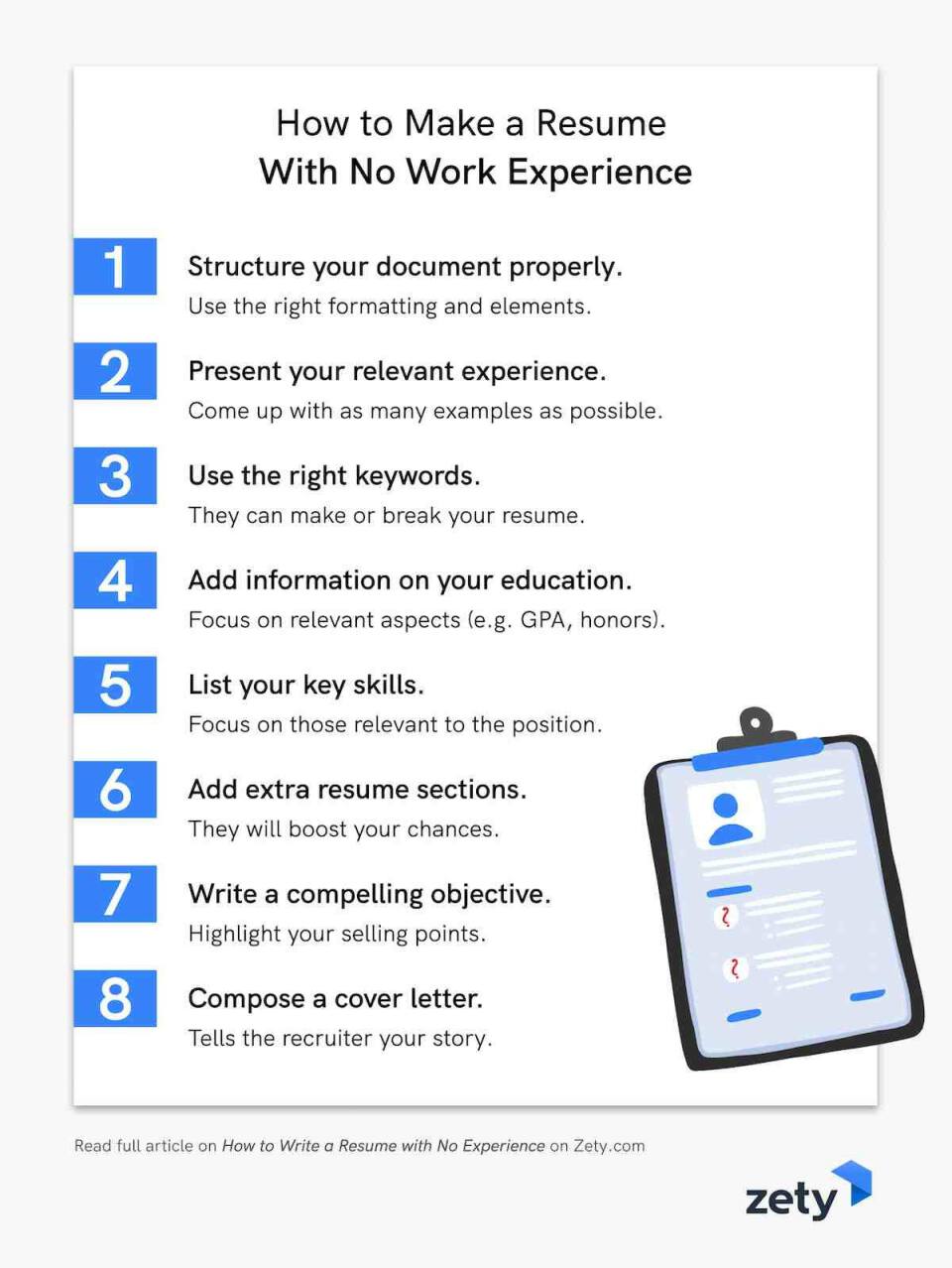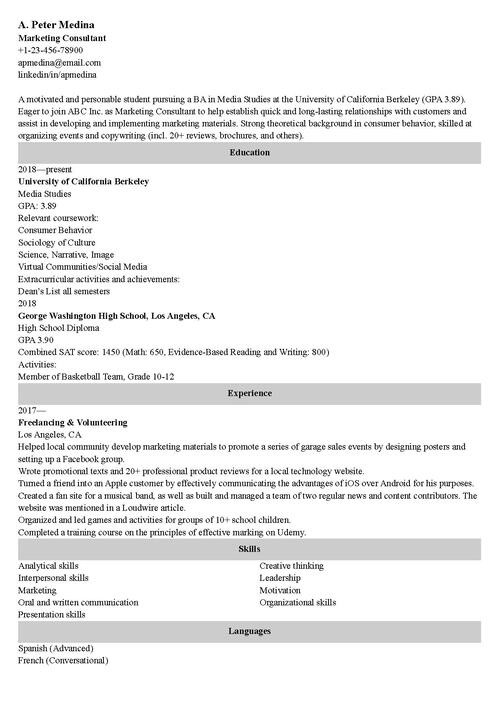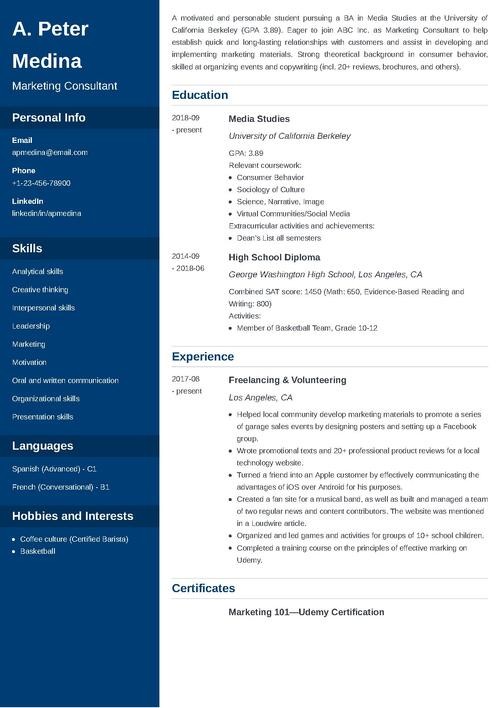
How to Make a Resume with No Experience: First Job Examples
Reading job ads can leave you feeling frustrated. It’s like all employers want candidates under 25 years old with 10+ years of experience! How’s that even possible?!
Don’t worry—we’ll show you that it’s possible to write an impressive resume with no experience. No matter if you need a high-school student resume with no work experience, or you’re older but had no meaningful career yet—you’ll learn how to make a resume with no experience in just a few minutes.
In this guide, we’ll show you:
- A first job resume sample better than 9 out of 10 resumes out there.
- How to leverage your relevant experience to get the job you want.
- How to write a resume from beginning to end
- What to focus on when your employment history is (close to) non-existent.
Want to save time and have your resume ready in 5 minutes? Try our resume builder. It’s fast and easy to use. Plus, you’ll get ready-made content to add with one click. See 20+ resume templates and create your resume here.
Sample resume made with our builder—See more resume samples here.
No matter where you are with your studies, we have covered it for you:
- Teen Resume Examples
- High School Student Resume
- High School Graduate Resume
- Student Resume Examples
- Undergraduate Resume
- Nursing Student Resume
- College Freshman Resume
- Current College Student Resume
- College Graduate Resume
- Internship Resume for College Students
- Entry-Level Resume
Are you looking for resume examples for specific jobs? See:
- Biology Resume With No Experience
- Career Change Resume Example
- Engineering Internship Resume
- Entry-Level Administrative Assistant Resume
- Entry Level IT Resume
- Entry Level Call Center Resume
- Entry Level Phlebotomist Resume
- Help Desk Resume No Experience
- New Teacher Resume
- Resume for a Part Time Job
- Tax Intern Resume
- Sample Resumes for 500+ Jobs
Sample Resume with No Work Experience
A. Peter Medina
Marketing Consultant
+1-23-456-78900
linkedin/in/apmedina
A motivated and personable student pursuing a BA in Media Studies at the University of California Berkeley (GPA 3.89). Eager to join ABC Inc. as Marketing Consultant to help establish quick and long-lasting relationships with customers and assist in developing and implementing marketing materials. Strong theoretical background in consumer behavior, skilled at organizing events and copywriting (incl. 20+ reviews, brochures, and others).
Education
2018—present
University of California Berkeley
Media Studies
GPA: 3.89
Relevant coursework:
- Consumer Behavior
- Sociology of Culture
- Science, Narrative, Image
- Virtual Communities/Social Media
Extracurricular activities and achievements:
- Dean’s List all semesters
2018
George Washington High School, Los Angeles, CA
High School Diploma
GPA 3.90
Combined SAT score: 1450 (Math: 650, Evidence-Based Reading and Writing: 800)
Activities:
- Member of Basketball Team, Grade 10-12
Experience
2017—
Freelancing & Volunteering
Los Angeles, CA
- Helped local community develop marketing materials to promote a series of garage sales events by designing posters and setting up a Facebook group.
- Wrote promotional texts and 20+ professional product reviews for a local technology website.
- Turned a friend into an Apple customer by effectively communicating the advantages of iOS over Android for his purposes.
- Created a fan site for a musical band, as well as built and managed a team of two regular news and content contributors. The website was mentioned in a Loudwire article.
- Organized and led games and activities for groups of 10+ school children.
- Completed a training course on the principles of effective marking on Udemy.
Skills
- Analytical skills
- Creative thinking
- Interpersonal skills
- Leadership
- Marketing
- Motivation
- Oral and written communication
- Organizational skills
- Presentation skills
Languages
- Spanish (Advanced)
- French (Conversational)
Certifications
- Marketing 101—Udemy Certification
Hobbies and Interests
- Coffee culture (Certified Barista)
- Basketball
Alright. Continue reading, and you’ll learn our bulletproof resume writing formula with detailed instructions and a first job resume sample.
1. Choose the Best Resume Structure
You’re about to write a resume with no job experience, which suggests… you haven’t had much experience writing a resume at all. But don’t worry—it’s much easier than you think. You simply need to follow the steps to create each section of your job application.
Here’s what to put on your resume:
- Header that includes your contact details.
- Objective, i.e. a short paragraph summarizing your skills.
- Education, where you add info on the schools you attended.
- Experience section. Paradoxical? Yes. But it may come in handy. You’ll see.
- Skills section, where you list your key abilities.
Apart from these, your resume will surely benefit from additional information as languages, hobbies, certifications, etc. Anything that you can do that’s relevant to the job you’re pursuing should end up on your resume with no work experience.
Would you like to add something more to your resume? Head straight to our guide: Resume Sections & Categories (with Tips on Order & Titles)
Now let’s move on to actually writing something.
2. Add Education to Your Resume with No Experience
Maybe you’re writing a resume for a high school student with no work experience. Or you’re in college and you’re looking for a part-time job so you can stop asking your parents for money. No matter the case, listing education could be your resume's key strength on a resume with no experience.
This is what you should include in the education section:
- Name and location of the school/college/university
- Years of education
- Information on your major
- GPA that’s high enough to put on a resume
- Relevant coursework
- Dean’s list
- Activities
- Extracurricular projects
- Honors, such as cum laude on a resume
- Study abroad programs you participated in
But beware—don’t fall into the trap of listing everything you can. Stick to the things that matter in the context of the job offer. For instance, only list your minor on your resume if it has something to do with the job for which you’re applying.
Also, if you’re a college student who hasn’t graduated, don’t worry—here’s how to put college on a resume if you haven't graduated yet.
Here’s what the education section on a resume with no experience for a college student can look like:
Resume for College Student with No Experience—Education Section
| Right |
|---|
2018–present University of California Berkeley Media Studies GPA: 3.89 Relevant coursework:
Extracurricular activities and achievements:
|
This example shows off high academic results because the job offer states that the role will require absorbing daily training sessions on product knowledge and strategy. Also, the candidate’s field of study is related to the job—that’s why listing relevant coursework makes perfect sense.
Here’s an example of a high school student resume with no work experience:
High School Student Resume with No Work Experience—Education Section
| Right |
|---|
George Washington High School, Los Angeles, CA Expected graduation date: 2021 Relevant coursework: Digital Media Arts, Social Media, Negotiation Extracurricular activities:
|
This teenager doesn’t have work experience, but we can guess they already have some useful skills!
If you still need more information on how to make the most of the education section on your resume with no experience, read our guide: How to Put Education on a Resume
3. Include Your Relevant Experience in a First-Time Resume (If You Have Any)
Recruiters only want one thing: hire the candidate who can do the job better than the rest. And the best way to see what candidates can do? Check what they did in the past!
This is where your relevant experience comes in. Don’t worry: it doesn’t have to be work experience. You can pick up valuable skills in plenty of settings, not just through employment.
The first step to identifying your relevant experience is to look at the job ad closely. Then, think of what you’ve done while at school, during freelance work, while volunteering, helping out family members, or by pursuing your hobbies, that matches the job requirements.
Here’s how to do it step-by-step:
- Read the job advertisement and take note of what exactly the role you’re pursuing involves.
- Think about all the things you’ve done that are related to the skills and duties the employer put on the job ad.
- Note those tasks down, for example: “wrote product reviews for a local tech-oriented website.” or “created a website for my favorite band and got mentioned in a Loudwire article.”
- Match your experience with the right resume keywords.
- Start each bullet point with a resume action verb such as collaborated, designed, improved.
- Use numbers to quantify your achievements wherever you can.
These guidelines are pretty clear. But the question is—where did you get your experience?
Here are your options:
Volunteering
This is one of the best ways to gain serious life experience—and volunteer work looks great on a resume. There are literally thousands of charities and NGOs you can support, and they all offer different opportunities. For example:
- Fundraising: many charities need fundraisers to contact various businesses and organizations and look for additional funding. This role helps you improve your communication and negotiation skills. It also helps to set realistic goals and find ways to achieve them.
- Tutoring: NGOs that support children and teens often need tutors of various subjects. By tutoring others, you can develop your soft skills, learn how to give clear instructions, and provide feedback.
- Organizing events: organizations often need volunteers to help prepare special events, such as charitable auctions, fundraising festivals, etc. It’s a great opportunity to boost organizational skills, learn about budgeting, and work on project coordination.
- Manual work: NGOs also need people for basic labor, such as renovating classrooms, setting up a community garden, helping out at a soup kitchen. These experiences might come handy—for example, if you apply for a restaurant job, having kitchen experience at a children’s shelter can make you stand out.
Internships
Pretty obvious, right?
Internships provide an opportunity to learn the fundamentals of a job while working alongside professionals. It’s best to start looking for internship positions while at college—the sooner you learn, the better your chances of getting good jobs after graduation.
You can add internship to the work experience section, or make a separate internships section in your resume.
When listing your internship experience on a resume, always mention:
- Name of the position, such as Accounting Intern
- Company name, location, and duration of the internship
- Your roles, responsibilities, and achievements
Extracurricular Activities
Your free time at school or college doesn’t have to be all spent on partying.
Shocking, I know. But sometimes it’s worth spending your free time on activities that can benefit you in the future. Think of students’ associations you could join. Consider going to conferences. Write articles for a students’ magazine. Join research projects.
Here are some examples of cool things you can do while at school:
- Set up a Facebook page for memes about your school, and learn the basics of social media marketing in the process
- Organize a mock Academy Awards night with students from the Film Club, and learn how to promote events while doing it
- Make interviews with local small business owners and get journalistic experience while writing article about succeeding in business
See? You can gain useful experience at any occasion.
Remember that while describing your experience in a resume, you should use resume keywords.
But hold on—do you know what exactly resume keywords are?
Many companies use the ATS (Applicant Tracking System) software to speed up recruitment. ATSs look for keywords on candidates’ resumes to decide if the candidate has relevant experience. Thanks to this initial screening, recruiters have fewer documents to look at.
This type of screening requires you to write an ATS-friendly resume. In other words: If you want to make your experience count, you have to use the wording of the job offer itself.
Here’s what it could look like:
Resume for Someone with No Work Experience—Example
| RIGHT |
|---|
2017— Freelancing & Volunteering Los Angeles, CA
|
Yep, the highlighted phrases include very common keywords. Using this kind of lingo to describe your experiences will help you to get past ATS screening and get noticed by recruiters.
| WRONG |
|---|
|
See the difference? This example talks about the same tasks but using different words. It’s far less impressive, isn’t it?
The examples above will work regardless of your education level. You can use the same approach when making a college or high school student resume with no experience.
If you’re not sure how to describe your experience effectively, read our guide: Make the Best Work Experience Section for a Resume
When making a resume in our builder, drag & drop bullet points, skills, and auto-fill the boring stuff. Spell check? Check. Start building a professional resume template here for free.
When you’re done, Zety’s resume builder will score your resume and tell you exactly how to make it better.
4. List Your Key Skills in a Resume for the First Job
You need to convince the recruiter you have what it takes to be successful in the role you’re pursuing. Since you have little (or no) work experience, you must give your skills as much prominence as possible.
How?
Go through the job offer carefully and make a list of all the skills you see there.
Examples of Skills for a Resume with No Experience
- Analytical skills
- Creative thinking skills
- Cross-functional collaboration skills
- Interpersonal skills
- Leadership skills
- Management skills
- Marketing skills
- Motivation
- Oral and written communication skills
- Organizational skills
- Presentation skills
- Proactive attitude
- Rapport building
- Soft skills
- Strong work ethics
- Teamwork skills
- Quick learning
Now—
Take a good look at the list you end up with, pick the ones that you have and can prove. If you decide to put a skill like leadership on your first job resume, make sure there’s an achievement or activity that testifies to this. In our sample resume with no experience, the candidate’s organizational skills are reflected in the bullet point that says the candidate organized activities for children, for example.

Don’t be tempted to lie on your resume because if you make it to the interview, all the lies will come out. And once they do, you’ll end up in a very uncomfortable situation.
Last but not least, remember to sprinkle your skills throughout your resume for the first job. Include some in the experience and education sections, as well as in your resume objective.
Not sure how to make the most of your skills on a resume? Read our guide: 99 Key Skills for a Resume (Best List of Examples for All Jobs)
5. Add Extra Sections for Maximum Impact
When your resume’s work experience section isn’t great, you must jump on every opportunity to make up for it elsewhere.
If you have language skills to show off, do it by all means. If you want to put certifications on a resume—list them as long as they’re relevant. If your hobbies and interests on a resume prove you’re a cultural fit, don’t hesitate to mention them.
Everything that’s relevant to the job should make its way to your resume—that’s how you can make a resume with no experience stand out.
Here’s a couple of examples of extra resume sections to give you some ideas:
First Job Resume Sample: Additional Sections
| Right |
|---|
Languages
Certifications
Hobbies and Interests
|
6. Write a Compelling Resume Objective
At this point, your resume with no experience has all it needs… except for the beginning.
And no, it’s not a joke. The best moment to write the opening paragraph of your “starter” resume is when everything else is in place.
Why?
You need to highlight the best parts of your resume… which is only possible once the entire document is ready. Then, write your resume objective statement. It’s a short introductory paragraph showing who you are and what skills you have that the company could benefit from.
Here is how a good resume would nail it:
- Read your resume closely and find up to 3 things you’d like to show off.
- Start with your strong character traits (motivated, personable). It’s best to take a look at the job ad to see what the employer needs rather than put random stuff here.
- Say who you are (student pursuing a BA in…) You can mention your academic achievements here (high GPA for instance).
- Mention the company you’re applying to by name to personalize your resume.
- Say what you want to do for the company. You can take a look at the job ad to see what tasks are listed.
- Say what your strengths are. You’re welcome to plug in a couple of your biggest accomplishments here as well.
Once you have more relevant experience, you’ll be writing a resume summary—a condensed version of your best professional achievements. At this stage, however, an objective will be perfectly fine.
Here’s what a resume objective can look like:
Resume Objective: No Experience Examples
| Right |
|---|
| A motivated and personable student pursuing a BA in Media Studies at the University of California Berkeley (GPA 3.89). Eager to join ABC Inc. as Marketing Consultant to help establish quick and long-lasting relationships with customers and assist in developing and implementing marketing materials. Strong theoretical background in consumer behavior, skilled at organizing events and copywriting (including 20+ reviews, brochures, and others). |
The good example follows a simple formula: who you are, what you want, what you can give back to the company. This is all you need to communicate in this section of your resume.
| Wrong |
|---|
| I am a student looking for my first job. I am a dedicated and motivated person with strong work ethics and willingness to develop. I would love to join your company to gain some hands-on marketing experience. |
The bad example has nothing of the above. It just expresses what the candidate wants, not what they can give to the company or what they want to do. Plus, it’s generic enough to fit any role at any company—and this is how you can quickly tell a poorly-written resume objective from a great one.
Not sure how to write a captivating opening of your resume? Head to our guide on How to Write a Professional Resume Profile—Examples, Statements & Tips
7. Format Your Resume for Readability
Your resume is almost done.
The only thing you need to do now is format it properly:
- Follow the reverse-chronological order (i.e. put the most recent info up top).
- Add section headings to make the document easier to navigate.
- Use professional-looking fonts that are easy on the recruiter’s eyes.
- Stick to the 11–12pt size range for regular text. Make the headings up to 4pt larger.
- Set the resume margins to 1-inch all around.
- Use single line spacing.
- Save your resume as a PDF file (unless you’re asked for a different file type).
This is it! Your document is ready to be sent out to the recruiter.
Want to learn more about resume formats? Read our guide: Resume Formats—Find the Best One for Your Needs
8. Write a Cover Letter to Boost Your Chances
Here’s the thing—About 50% of candidates send a cover letter along with their job application. Since your resume doesn’t exactly abound in professional experience, you can boost your chances of landing an interview by writing a great cover letter.
This is how to write a great cover letter:
- Make sure your cover letter format follows all the formal correspondence formatting rules.
- Write a captivating cover letter intro that introduces you to the reader and encourages them to read on.
- Say what skills you have, and they can be of benefit to the company.
- Explain why you’re a great cultural fit.
- Always end your cover letter with a call to action.
Also, make sure your cover letter has the right length.
Remember—
A cover letter shouldn’t repeat the content from your resume. Use it to tell the recruiter about your motivations, fill in the gaps on your resume, and convince them you’re the best candidate hands down.
Here’s a guide that will show you how to write a cover letter in several simple steps: How to Write a Cover Letter in No Time
Plus, a great cover letter that matches your resume will give you an advantage over other candidates. You can write it in our cover letter builder here. Here's what it may look like:
See more cover letter templates and start writing.
Now, let’s sum up the tips from this article:
How to Make a Resume With No Work Experience?

- Structure your document properly. Use the right formatting and elements.
- Present your relevant experience. Come up with as many examples as possible.
- Use the right keywords. They can make or break your resume.
- Add information on your education. Focus on relevant aspects (e.g. GPA, honors)
- List your key skills. Focus on those relevant to the position.
- Add extra resume sections. They will boost your chances.
- Write a compelling objective. Highlight your selling points.
- Compose a cover letter. Tell the recruiter your story.
Frequently Asked Questions about Resume with No Work Experience
Should I use resume templates to apply for my first job?
Yes, you should. Recruiters go through thousands of resumes every day, so a professional template is a great way to make your resume stand out from those of other candidates. A sleek resume design will go a long way towards making a good first impression. Wondering what your resume should look like? Choose one of Zety’s resume templates, designed to help you easily organize your resume format. Meanwhile, if you’re short on inspiration for what to write, have a look at our entry-level resume examples and student resume examples, written by our team. You can tailor this expert-made content to your needs and be ready to apply in no time.
What do I put in the resume summary if I have never worked before?
Even if you are a fresh graduate, you can still create a successful resume profile. While it’s not exactly possible to write a summary for a resume with no experience, what you can do instead is write a resume objective—the profile of choice for fresh grads and career-changers. Write two or three sentences with examples of your accomplishments and academic projects you led, mention your motivation for applying to this particular company, and add some information about your key skills. Finish off with a closing statement that will catch recruiters’ attention and make them want to invite you to a job interview.
Check out these professional resume objective examples to find out more.
How do I list my degree on a resume?
If you’re writing a resume with no experience, your academic history is likely to be your strongest asset. In order to properly list your degree on your resume, take the following steps:
- Create an education section in your resume.
- If you have no experience at all, you’ll be skipping the work experience section anyway. If you have a bit of professional experience, though, put the education section before the work experience section. Once you gain experience, your work history will go first.
- List only the highest level of education you’ve attained. If you need to mention more than one (e.g. because you’re still studying for your degree), list your levels of education in the reverse-chronological order (read more about resume order of jobs and experience).
- Add your degree, e.g. BA in Psychology, followed by the name of the institution, e.g. University of Massachusetts.
- Include your years of attendance, e.g. 2010–2014. If you’re still studying, specify your expected graduation year.
- Consider adding extra information about your degree in your resume (e.g. extracurricular activities, Latin honors, relevant coursework, projects, achievements, scholarships, Dean’s list, etc.). Only add your GPA to your resume if it was at least 3.5.
- Use consistent formatting for every entry.
If you haven’t completed your degree yet, read our guide about writing an undergraduate college student resume and see how to put unfinished college education on a resume.
Which skills should I include in my resume at the beginning of my career?
Having no job experience does not mean you don’t have any skills at all. Focus on the abilities you have acquired so far, be it at the university or during internships—these are your transferable skills. Mention both hard skills and soft skills, alongside any technical skills that you have, like software proficiencies. Have a look at skills examples that you can include in your resume:
- Analytical skills
- Creative thinking skills
- Cross-functional collaboration skills
- Interpersonal skills
- Leadership skills
- Management skills
- Presentation skills
- MS Office skills
- Quick learning
- Oral and written communication skills
- Organizational skills
In order to decide which ones should be put in your resume, go through the job offer carefully and make a list of all the skills you can see there—these are the potential resume keywords to use in your application. Then pick the ones that you think you have and include them in your resume. Tailoring your resume in this way helps to ensure that your application will pass ATS tests and actually reach a recruiter.
You can read more about this in our articles about key skills in a resume and making an ATS-friendly resume.
Do I need a cover letter for my resume if I have no job experience?
Definitely, yes. Even though you don’t have a lot of work experience, a well-written cover letter sets the right tone for your resume and shows that you’ve put in some extra effort in the recruitment process. What do you write in your entry-level cover letter? Since you don’t have any specific professional achievements, explain how your transferable skills can benefit the employer and demonstrate your motivation to join the company. Do not forget to pick a cover letter template matching your resume, and you’re all set!
If you still don’t know what to write, see our cover letter examples for more inspiration.
What are the best jobs for teens?
If you’re still at school and want to earn some cash, you may want to think about taking a summer or a part-time job. Here are some ideas for jobs suitable for teenagers:
- Yard worker
- Babysitter
- Dog walker
- House cleaner
- Tutor
- Grocery stocker
- Waiter
- Restaurant host
- Escape room attendant
- Box office ticket seller
Want to know more about this? Read our guide on best jobs for teens and see some resume examples for teens if you don’t know how to start writing your CV.
How do I explain my lack of experience in a job interview?
Attending a job interview when you have no prior job experience can be stressful. Don’t worry, though, as you can discuss things shown below and still nail it:
- In the absence of relevant job experience, lean on the other jobs or internships that you had up to that point and discuss transferable skills that could be useful in the position you are applying for, e.g. communication skills or teamwork skills.
- If you have no professional experience whatsoever, focus on the skills gathered in university projects, volunteering experience, or extracurricular activities. Give relevant details about your contribution to the project or team. Describe how your skills helped you excel in an unfamiliar situation.
- Use behavioral questions (i.e. those dealing with your experience, such as “Describe a time you had to resolve a conflict”) as an opportunity to demonstrate your abilities. Remember to use the STAR method to explain how you navigated difficult situations. Keep in mind that your answers have to be in line with the company's goals and values.
- For more impact, explain your motivation to join the company and show the recruiters that you’re there for a reason: that you’ve conducted thorough research and made a conscious decision to apply for this particular position.
To better prepare yourself for your first job interview, read about best job interview tips and tricks and top interview questions and answers.
Thanks for reading my guide! Now I’d love to hear from you:
- What are the biggest challenges of writing a resume with no work experience?
- What part do you struggle with the most?
- Let me know. Let’s get the discussion started!




